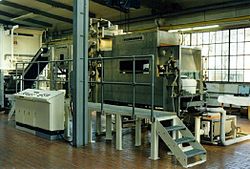In the last years ECCO has developed and continuously build up an additional business branch besides production and sales of high-performance lubricants: the production of industrial fibres made of renewable raw materials, favourably flax and hemp.
These fibers are alternatives for fibrous materials, as for example: Asbestos, Aramid, fiberglass or other synthetic fibers. There are other possible applications where no fibres at all have been used so far, e.g. reinforcement of aerated cement. As vegetable fibres have a broad variation of quality and physical characteristics, they often can be used for industry only to a limited extent. ECCO gave an answer to this in developing the “ultrasonic break-down” method for this kind of fibre-material. Further refining and finishing a series of different sort of fibres in constantly high quality.
Such fibres with the brand name Setralit® (Setralit - Wikipedia) may be used as process fibres or as reinforcement fibres in many technical processes or as a combination of both. As a result of raw material and refining processes the resulting fibre differs in colour and chemical attributes as well as in physical characteristics from conventionally “retted” natural fibres or fibres which are gained through sole mechanical treatment. Main advantages of “ultrasonic” natural plant fibres are:
The ultrasonic process allows use of nature-fibres and by-products of fibre production (shives, pectin) in many applications which were originally dominated by asbestos, and later by asbestos substitutes like glass or organic man-made fibres.
Setralit® - fibres are already being used successfully in the friction lining industry. Some other important market segments are construction and plastics industries, where Setralit® - fibres can be used in a wide spectrum of composites. They also may be used as reinforcing fibres for new basic materials and materials which did not contain fibres so far. Additional markets can be seen in the chemical industry (for example gaskets, thixotropic and delustering agents) as well as in the paper and textile industries.
SETRALIT® is the brand name of an industrially usable natural fiber. It has been improved by mechanical and / or chemical treatment and is suitable for high-quality applications.
There are many different types of SETRALIT®. Depending on the application they are btained from different raw materials and by different refining methods.
The starting material (raw material) is varied. In principle, all natural fibers are suitable for refinement. The bast fibers from annual plants (flax, hemp, jute, kenaf, etc.), fibers such as cotton, sisal, ramie, nettle, abaca, curauá, coconut are processed preferentially, however other plants are also suitable. The fibrous components of fiber plants (so-called shives) can be improved using appropriate setralit processes.
Thus SETRALIT® is a technical natural fiber based on "renewable resources".
For further information also have a look at Setralit - Wikipedia
SETRALIT® combines the positive properties of natural cellulose fiber with those of a synthetic fiber industry.
These are among others:
SETRALIT® is therefore a high-tech bio fiber, that has the technical potential but not the weaknesses of a synthetic fiber.
SETRALIT® is made in two stages:
First fiber disruption with ultrasound: This method was developed specifically for natural fibers and can vary depending on the starting material and the application.
2 In a further refinement process, the purified SETRALIT® fiber is, depending on the end use, cut, ground, fibrillated or otherwise treated.
"Setralit" refers to the combination of both stages. Both the ultrasound procedure and stage 2 are patented (material, method and device).
SETRALIT® is a raw material for industrial manufacturing and very versatile. In technically demanding applications (eg friction linings) expensive synthetic fibers (eg aramids) can be replaced.
It can be applied either to a fiber composite material (semifinished or compound) or directly into end products (fiber-reinforced materials, gaskets, mats, etc.).
Applications for SETRALITare:
Construction sector: cleaning, dry mortar, fiber cement, concrete, aerated concrete, plaster, screed, lime sand brick, plasterboard, insulation materials, insulation panels, emulsion paints.
Plastics: fiber-matrix semis, prepreg, SMC, BMC, injection molding, moldings, fiber reinforced plastics, in particular biopolymers.
Textiles: apparel, home textiles, industrial textiles, geotextiles, filter, spunlace nonwovens, medical and hygiene products.
Chemical industry: linings, seals, filter, fillers, thixotropic agents, bitumen, rubber, abrasives, cements, putty, glue.
Paper: Technical papers, cardboard, special papers.
Other applications (especially for shives and other by-products): animal bedding, bulk materials, animal feed (pectin, etc.), biogas, energy.
SETRALIT® is an ecologically and economically interesting alternative to synthetic fibers and conventional natural fibers. Many application areas in which early asbestos was used, can be covered with SETRALIT®. So SETRALIT® is also a replacement for asbestos.
SETRALIT® can compete with conventionally won natural fibers and high-quality synthetic fibers, such as Para-aramids. Compared to conventional natural fibers the high purity, consistent quality and higher thermal load capacity, are to be noted; compared with high-quality synthetic fibers, the environmental friendlyness in production and use, and the better price-performance ratio has to be pointed out.
The market for fiber made from renewable raw materials is growing strongly. The long term goal of ECCO is to advance the replacement of conventional mineral and synthetic fibers by anti-toxic vegetable fibers in the industry without having to compromise on performance or quality of the fibers.
According nova-Institut, Hürth, exist in the future for increased material utilization of agricultural commodities no alternatives. This form biomaterials, for example, biodegradable and durable bioplastics, natural fiber (bio) plastics (NFC) and Wood-Plastic-Composites (WPC), a particularly interesting new material group. The SETRALIt®-fiber is ideal for reinforcing such bioplastics, since it combines high performance with environmental benefits.
Our standard SETRALIT® fibrillated fiber type NfU / 31-2, can always be ordered through our contact form or by fax. For more information and free samples (up to 1 kg) we will be happy to assist you. Delivery times:
The following packages are available:
Growing market for high-tech natural fiber products
Access to innovative and patented technologies
Increasing political pressure